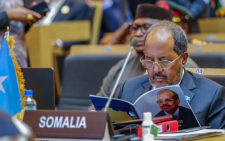Finance gas production to end
energy poverty, experts say

“There is too much gas opportunity without financing and too much financing with no gas opportunities.”
These are the words that NJ Ayuk, the chairman of the African Energy Chamber used to describe one of the biggest energy problems facing African countries, and which has conspired to increase what experts in the sector now call “energy poverty”.
Ayuk was addressing a continent-wide conference of energy experts in Johannesburg, South Africa yesterday. Ironically, Johannesburg is grappling with daily power rationing, known as “load shedding” in local parlance, despite South Africa being one of the leading electricity producers in Africa.
“We blame the people we put in charge,” said a city resident, echoing the sentiments of many South Africans who have to endure “energy poverty” even as their country hosts talks on how to turn around this sector. “You only get power if you protest”.
Yet, global companies like Russia’s Gazprom, have unlocked the magic formula of ending energy poverty and improving the quality of life for its citizens and many others in European countries like Germany by harnessing the power of natural gas. In the recent past, it has also started supplying gas to China.
“Natural gas is the key source of energy in Russia,” Albert Barkan, the head of Gazprom’s Design Directorate told the meeting in South Africa. “It is convenient, eco-friendly, reliable and economical.”
Over 32 million Russians rely on natural gas for cooking and lighting, while over 400,000 companies rely on the source of energy to power their companies, ensuring that production is not disrupted all year round because Russia has more than it needs for its consumption. According to Dmitry Khadoga, the head of the Department, Gazprom General, Russia has sufficient capacity to supply gas to all the countries in the world.
In Africa, the Democratic Republic of Congo, Libya, Senegal and Namibia have large deposits of gas but these remain untapped, denying their citizens the benefits of using green energy to improve the quality of life and reduce the destruction of forests, which provide the bulk of rural African families with the food they need for cooking and lighting.
“Why does gas matter?” Ayuk asked. Because, he said, in Africa, which has about 1.5 billion people, over 600,000 lack access to electricity. Another 900 million lack access to clean energy.
“Gas can drive prosperity in Africa,” Ayuk said. For this to happen, harnessing its potential must be financed.
“Gas is the future fuel of Africa. It can create jobs; it can keep hospitals open.” And it can make a difference on future outcomes by ensuring that young girls and boys have an opportunity to learn at home after school.
“Our young people do not have to cross the Mediterranean or walk across the Sahara in search of better prospects in other continents,” he said, making a case for increased use of gas to power industries.
Ilya Rogachev, the Russian ambassador to South Africa and Plenipotentiary to the Kingdom of Lesotho, agreed with the observation.
“Russia can offer South Africa an opportunity to resolve the power shedding problem,” he told the gathering that was also serving as a curtain raiser for the second Russia-Africa Summit to be held in St Petersburg next month.
“Gazprom can get gas from coal and South Africa has the 7th largest coal deposits in the world,” he said, exposing the conundrum that keeps African countries energy poor yet they retain huge untapped potential.
The company, which has built over 3,000 km of gas pipelines in Russia alone, is already undertaking large-scale energy projects in Nigeria and Libya and has made a commitment to make technology transfer one of its commitments at next month’s summit. Various speakers said it was wrong for Western countries to castigate the use of coal to produce gas, arguing that even those asking Africa not to walk that route were using the same sources of energy.
With cities in Africa expected to grow exponentially by 2040, Africa’s energy needs are only likely to increase, making it urgent for governments and private sector players to take interventions now to guarantee energy needs when the inevitable happens.
Adopting the production and use of gas will also help Africa reduce its food insecurity since some of its byproducts, such as hydrogen, can be used in the manufacture of fertilizer, which when used to grow grains like wheat and maize, can also increase animal feed production from the byproducts of grains, thus supplying both carbohydrates and proteins at affordable prices.
In the long run, gas also has the potential to bring down the cost of living in African countries especially if public transport vehicles, trains, factories and farm equipment make the switch from diesel and other fossil fuels to the












